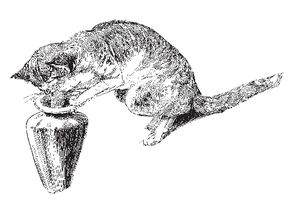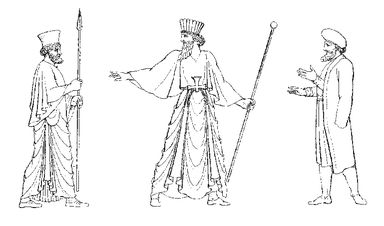Three Wise Cats (11 page)
Authors: Harold Konstantelos
“Wolves!” he gasped and leaped to his feet, throwing his blankets aside. “Wolves!” he shouted, and the entire camp woke, just as the sheep bleated in terror and crowded against an outcropping of rock. A huge wolf brazenly snatched the smallest sheep of the flock and dragged it away from the oasis; it kicked and struggled briefly until the wolf's hold on its throat deprived it of life. The sentries snatched up their spears and cudgels and began patrolling the outer rim of their small encampment.
Melchior and Balthazar also grasped cudgels and quickly herded the sheep into a small band. Kaspar took a torch and began setting smaller fires in a wide circle about the camp. Servants urged the camels to their feet and brought them close to the fire, which had been rekindled and now blazed mightily. In the darkness, the sounds of fighting, snarling wolves carried through the clear air.
The sheep were brought closest to the fire and then the camels were placed at one side of it. The packs were gathered into a low wall, atop which Ira stationed himself. His foster sisters went to help watch the sheep by the fire.
It grew colder, and the sky began to grow slightly less densely black as the sun started its slow ascent in the east. A light snow had dusted some of the surrounding hills as the travelers slept. Several times Ira saw shadows slipping through those same hills, but the wolves had fallen silent once the camp was awake and on guard.
After the sun rose, the servants prepared breakfast for the camp and half of the hired guards lay down to sleep while the others continued at their posts. Kezia and Abishag went to Ira.
“They caught us sleeping this time in reality,” he told them grimly. “I forgot all too soon the lessons Gracus taught me. I will resume standing sentry duty at night.”
“What are wolves, Ira?” Kezia asked him respectfully. With his harness on and his small jaw set, he truly looked like a soldier cat.
“Vicious, cunning animals that live in a pack. They are swift runners, and they kill not just to eat but also when the blood lust comes upon them. Or so said the soldiers under Gracus's command,” Ira told her bluntly. “They would have killed us, too, if they had seen us. I ate too well of rich meat and slept, forgetting my duty. Gracus would have me court-martialed, I am sure.” And Ira hung his head.
“But we are all safe,” Abishag answered. “Except for the poor sheepâand Kezia and I will stand guard duty with you each night. We sleep sufficiently during the daytime travel anyway.”

THE SAME SUNRISE found Gracus wakeful while on bivouac with a small contingent of men he was training. Although hundreds of miles away from them, Gracus had dreamed yet again of the three cats.
This is the day Polla and Citus are to take up residence in our new home. I shall ride back to the city tonight and surprise her. And I will ask her if she knows the significance of this dream.

POLLA COULD NOT help but stare as she rode in the cart with Citus, leaving the Roman legion encampment behind them. Zeugma, the city built on a steep hillside, which prospered mightily from the rich caravan trade and its river crossing, was certainly a sight at which to wonder.
“It is a strangely named city,” she said to Citus.
“It means âbridge' or âcrossroads' in the elders' form of Greek,” Citus answered her. “One of Alexander the Great's generals, Seleucus Nicator, founded it. How are you feeling? Is the jolting of the cart disturbing you?”
Although she was now visibly with child, she shook her head. “No, I am all right. Do we stop soon and camp, or what do we do?”
“Gracus wishes us to go to a house that he has now procured for you.” Citus smiled at the surprise upon Polla's face. “See those large houses upon the hills that encircle the city? Gracus has selected a home so that you may be comfortable while you await the birth of his son.”
Polla laughed. “And what if it is a daughter? Do I then assume my old tent?”
Citus shook his head. “You are going to be astonished at the beauty of your new home. The only material Zeugma lacks with which to build is marble. Without that, the artisans have resorted to crafting wondrous mosaics underfoot. When they need a certain color to finish a mosaic, if it is not readily procured from the gravel along the Euphrates, the artisans fashion stones of glass.”
Gracious paths and ornately planted gardens beguiled them as they walked up the path to their new home. Once inside, Polla looked at Neptune riding in his golden chariot surrounded by other water gods and goddesses, the entire scene forming the bottom of a large pond ringed with columns set about it.
“What is this?”
“It is called a peristylium,” Citus told her. “Notice how the figures seem to move, and how the light and shadows within the master craftsman's portrayal of the gods are perfectly balanced.”
Polla sank down onto a bench alongside the wall. “And this large room, which brings gardens inside, is an atrium?”
“You add greatly to your vocabulary.” Citus laughed.
“And so she should!” Gracus strode into the atrium and swept Polla up into his arms. “I have missed you while I have been on maneuvers. I fear the recruiting officers have somehow stumbled upon an entire field of donkeys turned into men, for these raw recruits are not trained at all. My little soldier knew more about drilling than I have yet been able to force into these stupid ones' heads!”

“Can you stay with us for the evening meal?” Polla asked eagerly.
“That is precisely why I have come, my heart.”
While eating, Gracus told Polla of his assignment. “I shall be taking these new soldiers and hardening them by training them to protect the trade routes. But two days' ride away from the city the bandits prey upon the caravans.”
“So you shall be teaching them in the midst of great danger to yourself.” Polla sighed.
“I am a soldier,” Gracus said simply. “I serve the emperor in whatever capacity he requests. But I have a question for you. Do you still believe the legends of your homeland, that women with child are also given the ability to read dreams?”
She nodded. “If not able to read dreams, we at least are often granted a sense of what is to come.”
“Then tell me what you sense of this: I dreamed again of my little soldier; I could hear wolves howling in the blackness of night, but he did not seem afraid. And then time seemed to pass, but I know not whether it was days or weeksâhe appeared in the daylight, and he had no limp.” Gracus swallowed hard. “Does this mean he has died, and the gods have granted him immortality?”
Polla clasped her hands together. “Did he seem to come toward you?”
“Yes, I remember more of the dream now. He actually ran to me, and he limped no longer. I picked him up and heard him purr. And I marveled that his leg was straight once again.”
Polla shook her head, and the thick blond braid swung as she did so. “The gods must have sent you this dream. I am sorry, but I cannot tell the meaning of it. If he has gone to a better place, perhaps with the gods somewhere, it is obvious he remembers you with love and admiration. What of the other two cats?”
“They were not in my dream.” Now it was Gracus's turn to sigh. “He would not leave his foster sisters. My heart fears he is dead, perhaps killed by the wolves I heard howling.”

Polla took Gracus's hand. “Then if this is true, he died a warrior's death, most probably defending his sisters.”
“But what then has happened to the wise men?” Gracus asked her. “Have they all perished upon the journey to find the King they sought?”
13
T
HE CAMEL CARAVAN journeyed two more days, and on the T morning of the third, as they made ready to strike their night's camp, the group was accosted by a surly band of soldiers. Their commanding officer rode up on a skittish horse and shouted at the travelers.
HE CAMEL CARAVAN journeyed two more days, and on the T morning of the third, as they made ready to strike their night's camp, the group was accosted by a surly band of soldiers. Their commanding officer rode up on a skittish horse and shouted at the travelers.
“Whoever is deemed head of this crowd of trespassers, come forth! You are not within boundaries of the designated routes.”
Kaspar looked at the other wise men, who nodded to him. The soldier's horse blew out its breath and danced about, frightened of the many camels, which were protesting and grumbling as the servants placed their packs and saddles upon them once again.
“I speak for us all,” Kaspar said quietly. “And surely we do not trespass with intent to do so. We seek safe passage to Jerusalem, but we were set upon by wolves two nights past. We may have strayed from the route then, for we had to move our camp to protect the livestock.”
“And what is your business in Jerusalem?” the officer demanded as he cleared his throat and spat. He had not even courteously dismounted while speaking to Kaspar. With a quick movement of his hand, he signaled his ragged group of foot soldiers to spread out along the edge of the camp while the servants finished preparing for the day's journey. Several of the men looked greedily at the packs, for here and there could be seen a glimpse of fine silks or tiny sparkles of jewelry.
“We seek the King of Kings,” Kaspar said simply. “Have you heard word of His birth?”
“His birth? We have but one king, the king of Judea, and that is King Herod. You must pay us passage and then we shall escort you to him, so you may pay him homage. If you do not, we will imprison you and divide your goods among us. What will you?”
Balthazar stepped forward. “We bring gifts fit for your king,” he assured the officer. “And passage money for those who serve him.” He drew a leather pouch from a belt at his waist and opened it. Small gold coins fell out upon his palm as he shook the bag gently. He stepped up to the officer's horse and offered two gold coins to the man.
Next he swiftly walked to the foot soldiers and gave each of them one gold coin. Suspiciously, they bit the coins he had given them, and then their sullen faces showed surprise and pleasure at finding the coins genuine.
Other books
The Editor's Wife by Clare Chambers
Red Helmet by Homer Hickam
H Is for Hawk by Helen Macdonald
BOUGHT: A Standalone Romance by Glenna Sinclair
Sharpe's Havoc by Cornwell, Bernard
The Lady Series by Denise Domning
Spooning Daisy by Maggie McConnell
Masquerade by Leone, Sarita
The Case That Time Forgot by Tracy Barrett